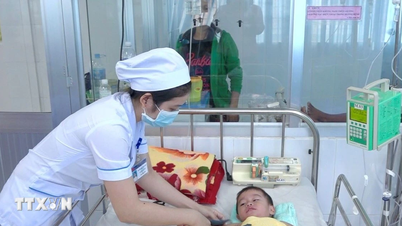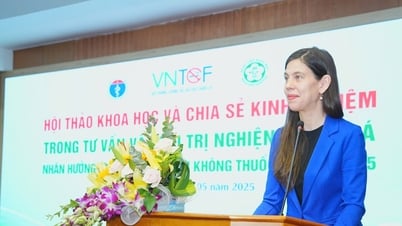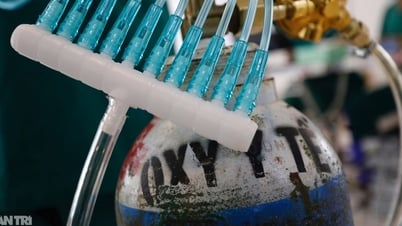
Doctor Mai Duy Ton examines a stroke patient at Bach Mai Hospital - Photo: BVCC
Warning of risk of stroke recurrence in patients with atrial fibrillation
According to information from Bach Mai Hospital, a study published in the prestigious medical journal JAMA Neurology (American Medical Association) analyzed 23 studies with the participation of more than 78,000 patients, showing that the annual risk of ischemic stroke recurrence in patients with atrial fibrillation after a first stroke is 3.75%.
Notably, in patients who were taking oral anticoagulants (OACs) as prescribed but unfortunately still experienced a stroke, this number jumped to 7.2% per year.
This means that even in the context of modern medicine with a proportion of patients having access to preventive anticoagulants, 1 in 6 patients with atrial fibrillation who have had a stroke can have a recurrence within 5 years, which is an alarming rate.
In addition, the risk of intracranial hemorrhage is also a potential risk, with an overall rate of 0.58%/year, and increased to 1.4%/year in the group that used anticoagulants but still had a stroke recurrence.
What to do to prevent stroke recurrence?
These findings are of great significance. They show that the fight against recurrent stroke in patients with atrial fibrillation remains arduous. Despite remarkable advances in preventive treatment, the potential risks still exist, requiring high vigilance from both the medical community and the community.
This fact raises an urgent need for further understanding of the pathogenesis of recurrent stroke, even with medication.
At the same time, there is a need for further individualization in risk stratification for each patient and, most importantly, the development of new, more effective treatments after the first stroke associated with atrial fibrillation.
Associate Professor, Dr. Mai Duy Ton - Director of the Stroke Center, Bach Mai Hospital recommends that patients who have had a stroke due to atrial fibrillation need to strictly follow the treatment regimen.
"Using anticoagulants as prescribed by your doctor is vital. Patients should never stop taking medication, change the dosage, or use someone else's prescription," Dr. Ton emphasized.
In addition, this expert also recommends that patients need to have regular check-ups. The check-ups are an opportunity for doctors to closely monitor health status, re-evaluate risks and effectiveness of drugs, and promptly adjust treatment regimens if necessary.
In addition, it is necessary to strictly control co-morbid risk factors such as high blood pressure, diabetes, dyslipidemia, overweight - obesity which are 'accomplices' in increasing the risk of stroke. Good control of these diseases will contribute to significantly reducing the risk.
"In particular, say no to cigarettes and limit alcohol as much as possible. Maintain a balanced diet rich in vegetables and fruits and increase physical activity appropriate to your health condition. This is a solid foundation for a healthy heart and brain," said Dr. Ton.
Signs of stroke to watch out for
Dr. Ton also recommends that patients and their relatives remember the signs of stroke (FAST) including: facial distortion (Face); weakness in the arms and legs (Arm); speech disorder (Speech). When detecting any signs, immediate action (Time) is needed - call 115 emergency or take the patient to the nearest medical facility capable of treating stroke within the golden time.
"If someone in the family has atrial fibrillation, especially if they have had a stroke, relatives need to pay attention and remind the patient about compliance with treatment and follow-up visits.
Recurrent stroke is a huge burden, but it is completely possible to minimize the risk with the right knowledge and timely action," said Dr. Ton.
Source: https://tuoitre.vn/nguy-co-tai-phat-dot-quy-do-rung-nhi-o-muc-dang-bao-dong-lam-gi-de-phong-tranh-20250523201016969.htm


![[Photo] Anh Hoang - Dinh Duc successfully defended the men's doubles championship of the National Table Tennis Championship of Nhan Dan Newspaper](https://vphoto.vietnam.vn/thumb/1200x675/vietnam/resource/IMAGE/2025/5/23/d6ab3bcac02c49928b38c729d795cac6)
![[Photo] Top players gather at the 2025 Nhan Dan Newspaper National Table Tennis Championship](https://vphoto.vietnam.vn/thumb/1200x675/vietnam/resource/IMAGE/2025/5/23/9ad5f6f4faf146b08335e5c446edb107)
























































![[Photo] The Central Party Executive Committee delegation visits former President Tran Duc Luong](https://vphoto.vietnam.vn/thumb/402x226/vietnam/resource/IMAGE/2025/5/24/32f67673454445aab0f1f2af331cb170)



































Comment (0)